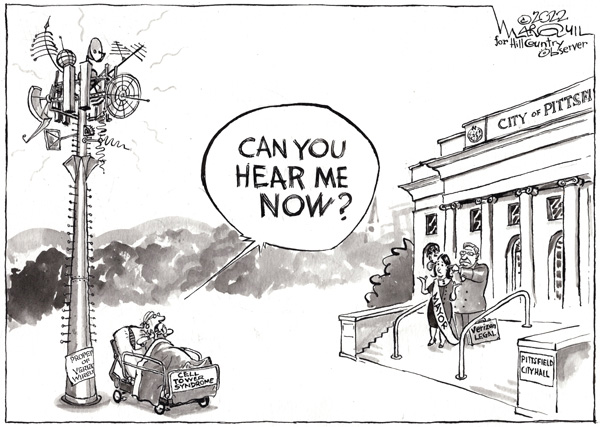Editorial July 2022
E D I T O R I A L
On Pittsfield cell tower, city’s leaders fumble
If 20 people were sickened by a toxic release from a chemical factory in their neighborhood, most of us would expect some public authority to take charge promptly to limit further public exposure and environmental damage.
So when 20 people in Pittsfield, Mass., began reporting nearly two years ago that they were being sickened by radio-frequency radiation from a new cell-phone tower near their homes, the city Board of Health mostly did what one would hope and expect: The board worked to mitigate what it concluded was an ongoing threat to public health.
As our cover story this month details, the local board spent months gathering information about the local residents’ symptoms. It heard from their doctors and from outside experts who’ve studied the health effects of radio-frequency radiation from cell towers. It also heard from Verizon, the telecommunications giant that controls the tower in question, which the company says could not possibly be causing its neighbors’ ailments.
In April, the board issued a 23-page “cease and desist” order directing Verizon to shut down the cell tower, which the board concluded was responsible for the residents’ health problems and had rendered their homes uninhabitable.
What happened next was entirely predictable. Verizon went to federal court seeking a declaratory judgment against the Board of Health, which it contended had overstepped its authority.
Meanwhile, throughout April and May, Mayor Linda Tyer and the City Council took no action on the Board of Health’s request for up to $84,000 in legal expenses to defend its order in court. And by June 1, the board, having no way to enforce its order, caved and withdrew it.
We don’t know exactly why the mayor and council failed to support the Board of Health, as they discussed the matter only in closed-door session. But it appears they were swayed by dire warnings that the city could wind up entangled in lengthy and costly litigation with Verizon.
To be sure, the city’s leaders have a duty to avoid wasting taxpayer funds on legal actions that are frivolous or have little chance of success. But they also have a mandate to protect public health -- and to back up that mandate with legal action when necessary.
In Massachusetts, local boards of health have broad responsibility for protecting public health in their communities. The latest edition of the state handbook for these local boards specifically mentions cell towers as “an emerging health issue” and goes on to say that “the fact that towers are ubiquitous must not be confused with the presumption that they do not present certain health risks.”
So despite Verizon’s claims to the contrary, the Pittsfield board was not ranging beyond its purview in considering the matter of cell-tower health effects. The board did its work and concluded that Verizon’s new tower was indeed harming the health of its neighbors – and that the city had a responsibility to protect them.
Pursuing the issue in court might have been an uphill fight. The science documenting the health effects of cell towers is new and emerging, and federal law exempts telecommunications companies from most local oversight.
But by effectively refusing to support the order of its own Board of Health, the city government abdicated its responsibility for the public health of those living near Verizon’s tower.


